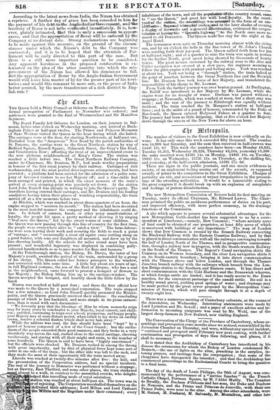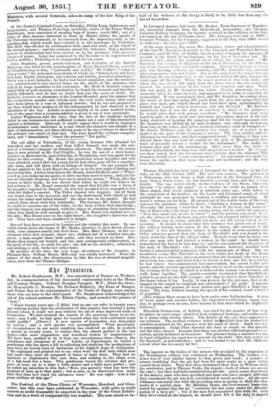311thnintio.
The number of visitors to the Great Exhibition is now evidently on the wane. It has only once this week exceeded fifty thousand. The number was 14,908 last Saturday, and the sum then received in •half-crowns was 14421. 17s. 6d. This week the numbers have been--on Monday 49,021, Tuesday 51,311, Wednesday 38,228, Thursday 43,244, yesterday 15,590: the sums received were 24391. 148. on Monday, 2493/. 10s. on Tuesday, 19011. 118. on Wednesday, 21731. 118. on Thursday, at the shilling, fee, and yesterday, at the half-crown admission, 15591. 178. 6d.
There are signs in the public journals, and one meets evidences in society, of an unpleasant feeling arising out of the awards, or supposed awards, of prizes to the competitors in the Great Exhibition. Charges of partiality are rife, and accusations of unjust irregularities in the proceed- ings of the awarding authorities. It would be a lamentable. ending to the greet congress if it should break up -with an explosion of complaints and •feelings of jealous dissatisfaction.
The new Metropolitan Commission of Sewers held its first-meeting on Tuesday, under its official Chairman, Mr. Edward Lewes. The Chair- man promised the public an assiduous performance of duties on his part, and improved efficiency, with -more perfect economy, in the :drainage functions of the Commission.
A site which appears to possess several substantial advantages for the new Metropolitan Cattle-market has been suggested to -us by a corre- spondent at Limebouse,—namely, Bow Common; "where seventy acres of land could be obtained of one proprietor, at least fifty acres of which is uncovered with buildings of any importance." The map of London shows that Bow Common is crossed by the Branch' Railway-connecting the Blackwell Railway with the Eastern Counties Railway, and by that is placed in direct communication with all the railways converging towards the half of London North of the Thames, andimprospective communica- tion, through a railway now in progress, with the South-western Railway on'the South of the Thames. The Regent's Canal navigation skirts the Common on its Western boundary, and the river Lea navigation skirts it on its South-eastern boundary ; bringing it into direct communication with the Thames above and below London, and through the Thames Junction branch railway with the railways-which branch 'from the Lon- don Bridge station to the Southern-and Eastern coasts. • It has direct and short communication with the Cold. Harbour and-the Brunswiek-wharves, at which foreign cattle are landed; and it-has ready access to the Essex marshes, •for the convenient pasturage of the unsold cattle. Itesoil is-a healthy sound gravel, yielding good springs of water; and drainage may be made perfect by the great sewer proposed by the Metropolitan Com- mission of Sewers, which will pass straight through it at a :depth of twenty-eight feet.
There was a numerous meeting of Canterbury colonists, at the rooms of the Association, on Wednesday. Interesting statements were made by Lord Lyttelton and Mr. Sewell ; and a paper of excellent advice and in- formation to intending emigrants was read by Mr. Weld, one of the largest sheep-farmers in New Zealand, now visiting. England.
The Convocation of the Clergy of the Province of Canterbury, -whose as- semblage and prorogation some months since we noticed, reassembled in the Jerusalem Chamber on Thursday, and were,-without any-special incident, "continued and prorogued until February now nett coming, with further continuation and prorogation of days then following, and 'places, if it shall be necessary."
It is stated that the Archbishop of Canterbury has interdicted in his diocese the ceremonies for which the Bishop of London condemned Mr. Bennett, —the use of •lights on the altar, preaching in the surplice, in- toning prayers, and turnings from the congregation ; that some of the clergymen have disregarded the interdict ; and that the Archbishop has commenced proceedings in the Ecclesiastical Courts-M.bring the question to a final issue,
The day of the death of Louis Philippe, the 26th of 'August, was com- memorated by the performance of a " service funebre" in tie French Catholic Chapel, Portman Square, by M. l'Abbe Mailly.
T
de Neuilly, the Duchess & r
Orleans and hetons, the DukeahnedCDouunchteessss de Nemours, and the Prince and :Princess de-loinville, with their son Prince Pedro, were near to the altar. Among-the other attendants, were M.:01u.zot, M. Duthatel, M, fialvandy, M. -Montalivet, and other late
Ministers, with several ,Generals aides-de-camp of the late King of the French.
• At the Central Criminal Court,•on Saturday, Philip Long, lighterman and bargenmster, and Thomas Pickering, merchant, owner of the Union Wharf, Limehouse, were ooavicted of .stealing bags of-,guano, worth 1001., out of a cargo of that ,manure intrusted to them by Messrs. Gibbs, the 'agents of the Peruvian Government, to be conveyed from the importing-ship to the caasting,ship which would have carried -it to the purohaeer . in Yorkshire. The theft was effected by adulteration with .sand and marl, at the wharf of the second prisoner ; and the evidence raised the inference that a nefarious system of adulteration had been carried on by tho prisoners with previous cargoes of guano. Long was sentenced by the Recorder to be imprisoned for twelve months; Pickering to be transported for ten years. • John Stephens, grocer, potato-salesman, and herbalist, of the Ratcliff Iliehway, was tried for the manslaughter of Harry Steward Davis, a youth, by administering to him, " ignorantly and rashly," Dr. Coffin's " composi- tion powder," the principal ingredients of which are " babery bark and hem- lock bark, highly astringent, and valerian and lobelia, powerful stimulants." Davis was a poor imbecile; ho bad a bad bowel complaint, and the medicine was administered to him several times on the advice of the prisoner, who sells it by large quantities to his customers. Mr. Mark It. Garrett, surgeon, stated that on post-mortem examination he found the stomach and intestines highly inflamed, and he had no doubt that was the cause of death. Dr. Letheby, lecturer on chemistry at the London Hospital, gave his opinion that the composition -powder and lobeliaavere the very worst things that could have been given, in .a case of inflamed bowels; but he was not prepared to say they would have produced all the inflammation he had observed in the intestines of the boy. Lobelia is spoken highly Of in some medical but at the same time a recommendation is given to use it very cautiously. Justice Wightman told the Jury, that the fact of the medicine having failed in one Instance.as not-sufficient to.make out.a case of this description against a defendant. Although, it -might appear that it woulrIbe improper to administer. druch medicines- in a case where the stomach wes.already in a state of inflammation, yet thenedid not seem to be any evidence to show that the prisoner was aware of that-fact. The Jury heard the evidence recapitu- lated, and "immediately "found the prisoner "Not guilty."
The sad .affair at Tottenham, of the young German who attacked his betrothed and her mother, and then killed himself, was made the sub- ject of a Coroner'a inquest on Seturda.y.afternoon. The mime of the, young man is now printed as Mr. Carl Crighlo ; he was the son of ,a steel-manu- facturer at itattenbrech, nearSchwelinon Westphalia, and was agent for ins father in this country. -Mr. Brand, the gentleman whose daughter and wife were attacked, stated that his young friend had often gone off for a consider- able time, and left them with no tidings of himself. On one occasion Mr. Brand applied to the Lord Mayor for advice as to the best mode of linding and recovering him. A letter from him to Mr. Brand, dated Sheffield, said—" Wher- ever I go you strike me incognito, or drive me from.town to town •, and yea fol- low me through England, and force me to spend my money." When„ after his return in three .weeks, he was shown that letter, he could not believe he had written it. Mr. Brand corrected the report that Crighlo was a lover of his daughter rejected by himself; he was her accepted lover,-engaged to her with her father's consent. The Police showed two daggers; one of them was found close to the deceased, and was the instrument with which he had struck the ladies and killed himself: the other was in his-pocket. He had carried these about with him habitually. The. Coroner, Mr. Baker, thought he ought to examine one of the ladies on the facts within their,knowledge ; and the inquest was adjourned, with the object of obtaining their testimony when they shall be well enough to give it. Mrs. Brand.was stabbed once in the side; Miss Brand once in the right breast ; the daughter's hand was also cut. They have not been considered in danger.
Several fires have occurred in London and the vicinity this week. By one which burnt down the house of Mr. Marks, plumber, in East Street, Green- wich, some inmates nearly lost their lives. Mrs. Mary Thomas, in her ex- citement when first aroused, threw two children out of a window into the street: a man caught them both safely, and they received no hurt. Mrs. Marks then leaped out herself, ,and the man courageously endeavoured, at the peril of, his life, to catch her. also : •the fell en his shoulder, eebounded, and striking a wall, broke her collar-bone.
By another of the fires, the very large oil-refinery of Mr. Crossley, in Pleasant Row, Pelham Street, -Mile-end, was wholly destroyed. From the nature of the stock, the illumination by this fire was of unusual magnifi- cence, seen from the' Thames Bridges.



























 Previous page
Previous page